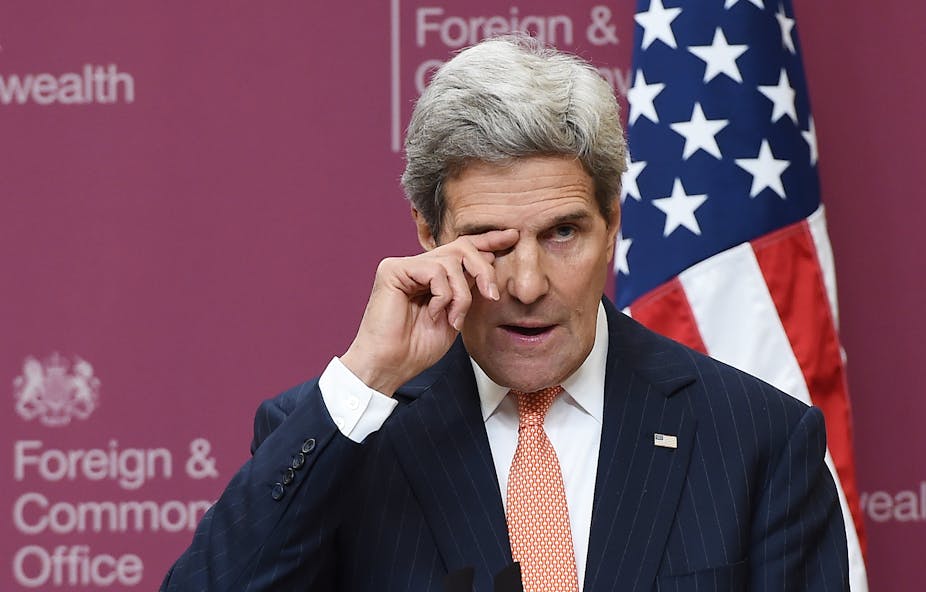Ministers from 21 countries gathered in London on January 22 to discuss the fight against Islamic State (IS). They had their photo opportunity and issued their statements. US secretary of state, John Kerry, told them that almost 6,000 jihadists had been killed, and almost 700 square kilometres of Iraqi territory retaken.
But at the end of the day, all of this had precious little to do with the issue of how to confront IS’s political, military, and social expansion.
None of the officials from the 21 countries would state the obvious: without a determined strategy to challenge IS on the ground as well as from the air in Syria and in Iraq, the best that can be achieved is “containment” of the jihadists.
And none acknowledged that, without a long-term approach to deal with deep-set political grievances in both countries, IS will continue to appeal to – and recruit – many more people.
Credit where it’s due
The US-led aerial intervention in Iraq, which began in August 2014, has certainly checked IS’s advance. It bolstered Kurdish forces as IS neared the Iraqi Kurdistan capital of Erbil; it has helped those same forces retake some key positions, such as the Mosul Dam, and to recapture some areas of north-west Iraq.
However, the Iraqi military’s success in the east, west, and south after its near-collapse in summer 2014 owes more to Iranian support and the rise of Shia militias than to any American efforts.
At best, Washington has tacitly accepted that Baghdad’s security depends more on Tehran and the Shia groups than on US strategy. Kerry’s boast about the thousands of IS bodies – almost half of the estimated jihadist force – was a simple attempt to kick dust over this reality. Indeed, even before the statement was made, former US defense secretary, Chuck Hagel, was trying to temper it: “I was in a war [in Vietnam] where we did body counts and we lost that one.”
Nor did Kerry admit that his proclamation had little to do with the prospects of long-term stability in Iraq. There is still no sign of a truly stable government that could deal with rampant corruption and the Sunni minority’s suspicions of a Shia-led system. And, if anything, the rise of the anti-IS militias Kerry credits the US with helping – themselves accused of perpetrating abuses against the population – is likely only to add to the real challenge.
Meanwhile, the situation in Syria is even more fraught.
Grasp the nettle
Kerry could brag that US-led bombing has helped the Kurdish town of Kobanê, near Syria’s border with Turkey, hold out against three months of IS attacks. But at the same time, IS has expanded its hold on territory in much of northern and eastern Syria, taking on both the Assad regime and Syrian opposition forces. It is still secure in its Syrian centre, Raqqa, the largest city outside the Damascus regime’s control; it has established a local government and economy, and from that base it now controls most of Syria’s oil and gas fields.

The blunt reality is that with the exception of Kobanê, there can be no effective campaign against the IS without the support of a local ground force.
But the Obama administration has stopped short of giving that support. Aside from air strikes, it has done little more but drip-feed limited supplies to a handful of “moderate” insurgents, refusing to take essential measures even after the Assad regime’s chemical weapons attacks of August 2013 (Obama’s initial “red line”).
Instead of grasping the nettle, Washington authorised US$500m to fund a token program to train and equip 5,000 moderate fighters to face IS on the ground. The training will not begin until late March 2015 at the earliest, and the first batch of fighters will not be ready for the battlefield before the end of the year.
Indeed, the biggest recent shift in the US’s Syria policy has more to do with the Assad regime than IS: Kerry has now at last reneged on America’s long-held position that Assad must eventually give up power to a transitional government.
With that retraction, the dim prospect of any allied ground effort – unless the US decides to ally with the regime’s forces – has all but vanished.
The war at home
Meanwhile, instead of confronting the difficulties in Iraq and Syria without reservation, the Euro-American allies are fixating on the problem of “jihadists over here”. Instead of focusing on dealing with the political, economic and social situation that has fostered the rise of IS and taking the measures that are really needed to deal with it, Western governments are fixated on their own extremists, who will supposedly return from fighting in the Middle East to wreak havoc in Europe and the US.
To be sure, the threat of attacks “over here” is serious and is not to be dismissed, as events in France and Belgium have shown. But those attacks cannot be separated from the turmoil in areas such as (but not limited to) Iraq and Syria – and by extension, the West’s failure to help put a stop to it.
This is not just testament to the dangers of Islamic extremism around the world; it also proves it’s far easier for the West to tell tales of “foreign fighters” and “jihadology” than to work hard on the deeper causes and broader consequences of the Iraqi and Syrian disasters.
There are alternatives that could really challenge the IS: an Iraqi Kurdistan with real international recognition and support, an Iraqi government answering to all communities, a Syrian opposition supported in a political vision that overcomes not only the jihadists but the Assad regime.
But the London summit proved these things are still out of reach – or at least too much for the allies to openly contemplate.

